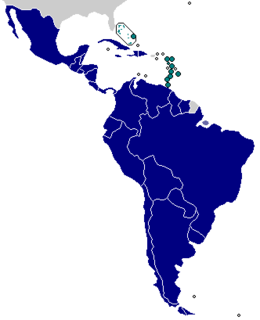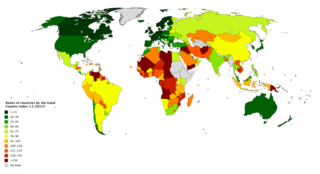
Latin America is the portion of the Americas comprising countries and regions where Romance languages—languages that derived from Latin—such as Spanish, Portuguese, and French are predominantly spoken. The term is used for those places once ruled under the Spanish, Portuguese, and French empires. Parts of the United States and Canada where Romance languages are primarily spoken are not usually included due to being collectively grouped as Anglo-America. The term is broader than categories such as Hispanic America, which specifically refers to Spanish-speaking countries; and Ibero-America, which specifically refers to both Spanish and Portuguese-speaking countries. The term is also more recent in origin.

Telefónica, S.A. is a Spanish multinational telecommunications company headquartered in Madrid, Spain. It is one of the largest telephone operators and mobile network providers in the world. It provides fixed and mobile telephony, broadband, and subscription television, operating in Europe and the Americas.

Uruguay, officially the Oriental Republic of the Uruguay, is a country in South America. It shares borders with Argentina to its west and southwest and Brazil to its north and northeast; while bordering the Río de la Plata to the south and the Atlantic Ocean to the southeast. Uruguay covers an area of approximately 176,000 square kilometers (68,000 sq mi) and has a population of an estimated 3.51 million, of whom 2 million live in the metropolitan area of its capital and largest city, Montevideo.

The economy of Uruguay features an export-oriented agricultural sector and a well-educated workforce, along with high levels of social spending. Tourism and banking are also important sectors; Uruguay acts as a regional hub for international finance and tourism. The country also has a history and representation of advanced workers-rights protection, with unions and the eight-hour work-day protected at the beginning of the 20th century.

The Free Trade Area of the Americas (FTAA) was a proposed agreement to eliminate or reduce the trade barriers among all countries in the Americas, excluding Cuba. Negotiations to establish the FTAA ended in failure, however, with all parties unable to reach an agreement by the 2005 deadline they had set for themselves.

The Index of Economic Freedom is an annual index and ranking created in 1995 by conservative think-tank The Heritage Foundation and The Wall Street Journal to measure the degree of economic freedom in the world's nations. The creators of the index claim to take an approach inspired by Adam Smith's in The Wealth of Nations, that "basic institutions that protect the liberty of individuals to pursue their own economic interests result in greater prosperity for the larger society".
College and university rankings are rankings of institutions in higher education based on combinations of various factors. None of the rankings give a comprehensive overview of the strengths of the institutions because all select a range of quantifiable characteristics to base their results on. Rankings have been conducted by magazines, newspapers, websites, governments, and academics. In addition to ranking entire institutions, organizations rank programs, departments, and schools. Rankings consider various combinations of measures of funding and endowment, research excellence and/or influence, specialization expertise, admissions, student options, award numbers, internationalization, graduate employment, industrial linkage, historical reputation and other criteria. Various rankings mostly evaluating on institutional output by research. Some rankings evaluate institutions within a single country, while others assess institutions worldwide. The subject has produced much debate about rankings' usefulness and accuracy. The expanding diversity in rating methodologies and accompanying criticisms of each indicate the lack of consensus in the field. Further, it seems possible to game the ranking systems through excessive self-citations or by researchers supporting each other in surveys. UNESCO has questioned whether rankings "do more harm than good", while acknowledging that "Rightly or wrongly, they are perceived as a measure of quality and so create intense competition between universities all over the world".

The Rio Group (G-Rio) was a permanent association of political consultation of Latin America and Caribbean countries, created in Rio de Janeiro, Brazil on December 18, 1986 with the purpose of creating a better political relationship among the countries. It was succeeded in 2011 by the Community of Latin American and Caribbean States

Banco Itaú Unibanco S.A. is a Brazilian financial services company headquartered in São Paulo, Brazil. Itaú Unibanco was formed through the merger of Banco Itaú and Unibanco in 2008. It is the second largest banking institution in Brazil, as well as the second largest in Latin America, and the seventy-first largest bank in the world. It is also one of twenty most valuable banks in the world. The bank is listed at the B3 in São Paulo and in NYSE in New York.
The Latin American Free Trade Association, LAFTA, was created in the 1960 Treaty of Montevideo by Argentina, Brazil, Chile, Mexico, Paraguay, Peru, and Uruguay. The signatories hoped to create a common market in Latin America and offered tariff rebates among member nations. In 1980, LAFTA reorganized into the Latin American Integration Association (ALADI) which now has 13 members: Argentina, Bolivia, Brazil, Chile, Colombia, Cuba, Ecuador, Mexico, Panama, Paraguay, Peru, Uruguay, and Venezuela.

The ease of doing business index was an index created jointly by Simeon Djankov, Michael Klein, and Caralee McLiesh, three leading economists at the World Bank Group. The academic research for the report was done jointly with professors Edward Glaeser, Oliver Hart, and Andrei Shleifer. Higher rankings indicated better, usually simpler, regulations for businesses and stronger protections of property rights. Empirical research funded by the World Bank to justify their work show that the economic growth impact of improving these regulations is strong. Though the first report was authored by Djankov, Klein, and McLiesh, and they continue to be listed as "founders" of the report, some sources attribute the genesis of the idea to Djankov and Gerhard Pohl. The report was discontinued by the World Bank on September 16, 2021, following the release of an independent audit of the data irregularities. The audit documented how bank leadership pressured experts to manipulate the results of the 2018 and 2020 Doing Business Reports.
INCAE Business School is an international business school located at the Francisco de Sola campus in Nicaragua and the Walter Kissling Gam campus in Costa Rica. The Financial Times has ranked INCAE as a top global MBA program and The Wall Street Journal has ranked INCAE Business School as one of the top 10 international business schools in the world.
The following are international rankings of Panama

The following outline is provided as an overview of and topical guide to South America.

China–Uruguay relations are the relations between the People's Republic of China and the Oriental Republic of Uruguay. Relations between both nations were first established in 1988. Relations were defined as “friendly and cooperative” by the Chinese government. The bilateral relation was promoted to a strategic partnership in 2016.

Enel Americas is a conglomerate of electric energy companies operating in South America and Central America countries: Argentina, Brazil, Colombia, Peru, Costa Rica, Panama and Guatemala. Through its affiliates it generates, transmits and distributes electric power.

Mercosur, Mercosul, or Ñemby Ñemuha, officially Southern Common Market, is a South American trade bloc established by the Treaty of Asunción in 1991 and Protocol of Ouro Preto in 1994. Its full members are Argentina, Brazil, Paraguay, and Uruguay. Venezuela is a full member but has been suspended since 1 December 2016. Associate countries are Bolivia, Chile, Colombia, Ecuador, Guyana, Peru and Suriname.
In the late 2000s and early 2010s, advocacy for drug legalization has increased in Latin America. Spearheading the movement Uruguayan government announced in 2012 plans to legalize state-controlled sales of marijuana in order to fight drug-related crimes.

The Good Country Index measures how much each of the 163 countries on the list contribute to the planet, and to the human race, through their policies and behaviors.

The economy of Central America is the eleventh-largest economy in Latin America, behind Brazil, Mexico, Argentina and Colombia. According to the World Bank, the nominal GDP of Central America reached 204 billion US dollar in 2010, as recovery from the crisis of 2009, where gross domestic product (GDP) suffered a decline to 3.8%. The major economic income are the agriculture and tourism, although the industrial sector is in strong growth, mainly in Panama.














